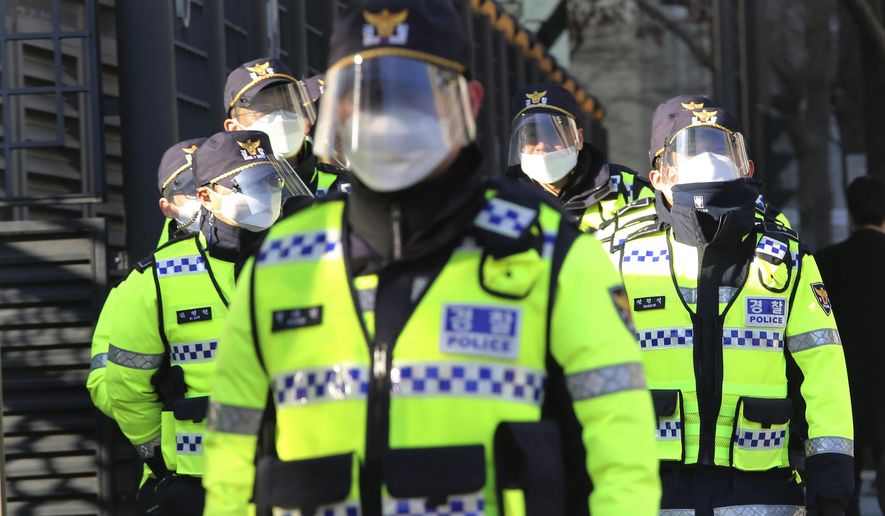SEOUL, South Korea (AP) - South Korea has reported 686 new cases of the coronavirus, tying its second-highest daily jump since the emergence of the pandemic, as a resurgence driven by the greater capital area threatens to erase hard-won gains against the virus.
The Korea Disease Control and Prevention Agency said Wednesday that 536 of the new cases were reported in the Seoul metropolitan area, where new clusters of infections have been popping up from seemingly everywhere, including restaurants, markets, saunas, hospitals, long-term care facilities and army units.
The country’s caseload is now at 39,432, including 556 deaths. The agency said 149 among 8,699 active patients were in serious or critical condition, a group that is being closely monitored amid concerns about a possible shortage in intensive-care beds.
South Korea also reported 686 cases on March 2 during a major outbreak in its southeastern region, which health workers managed to contain by April with an aggressive test-and-quarantine campaign.
While South Korea had been seen as a success story against COVID-19 since, critics said the country let its guard down by easing social distancing restrictions to the lowest tier in October, even as experts warned of a surge during cold weather months when people spend longer hours indoors.
Officials have restored some of the restrictions in recent weeks, shutting down nightclubs and gyms and allowing restaurants to provide only deliveries and take-outs after 9 p.m., and could be forced to clamp down on economic activity further if the viral spread doesn’t slow.
In other developments in the region:
- The United Arab Emirates said Wednesday an experimental Chinese coronavirus vaccine tested in the federation of sheikhdoms is 86% effective, in a statement that provided few details but marked the first public release of information on the efficacy of the shot. The UAE conducted a trial beginning in September of the vaccine candidate from Chinese state-owned pharmaceutical giant Sinopharm involving 31,000 volunteers from 125 nations. Volunteers between 18 and 60 years old received two doses of the vaccine over 28 days. The UAE’s Health and Prevention Ministry announced the results via a statement on the state-run WAM news agency. It wasn’t immediately clear if the results included only those taking part in the testing in the UAE or if they also included results from China and elsewhere. The statement described the vaccine as receiving “official registration,” without elaborating on what that meant. Emirati officials and Sinopharm did not immediately respond to questions from The Associated Press. The Sinopharm vaccine has been approved for emergency use in a few countries and the company is still conducting late-stage clinical trials in 10 countries. Sinopharm’s shot relies on a tested technology, using a killed virus to deliver the vaccine, similar to how polio immunizations are made. Leading Western competitors such as Pfizer and its German partner BioNTech use newer, less-proven technology to target the coronavirus’ spike protein using RNA.
- An elderly passenger on board a Royal Caribbean “cruise to nowhere” has been diagnosed with the coronavirus, prompting the voyage to be cut short as the vessel returned to Singapore on Wednesday. The 83-year-old guest on the Quantum of the Seas tested positive for COVID-19 after reporting to the ship’s medical center with diarrhea, said Annie Chang, director of cruise at Singapore’s Tourism Board. The passenger had tested negative prior to boarding, Chang said. “The passenger was immediately isolated and his initial close contacts were identified and isolated,” she said in a statement, adding that the contacts have since tested negative. Singapore recently began a “safe cruising” pilot program allowing cruise ships to make round trips from Singapore with no ports of call in between. Strict safety measures were imposed, including reducing capacity by half and pre-boarding testing of passengers. Royal Caribbean is one of two operators licensed to run such trips.
- Hong Kong is reimposing a ban on in-restaurant dining after 6 p.m. and closing gyms, beauty parlors and other businesses and public venues as it tries to get a grip on the latest surge of coronavirus infections in the territory. Restaurants may only provide takeout between 6 p.m. and 5 a.m. and while open, must limit numbers of patrons to 50% of capacity. Enforcement of the new measures will begin Thursday and remain in effect for two weeks. Hong Kong has already limited public gatherings to just two people and closed bars and other entertainment venues. Hong Kong on Wednesday reported an additional 100 cases, bringing its two-week total to 1,274. Most are cases of local transmission and the origins of 303 remain unknown, according to the government’s Center for Health Protection. Hong Kong has reported a total of 7,075 cases, including 112 deaths. In mainland China, authorities reported an additional four cases detected in the southwestern city of Chengdu, where authorities have locked down some neighborhoods and ordered widespread testing to curb a new outbreak that now totals nine confirmed cases.
___
Follow AP’s coverage at https://apnews.com/hub/coronavirus-pandemic and https://apnews.com/UnderstandingtheOutbreak




Please read our comment policy before commenting.